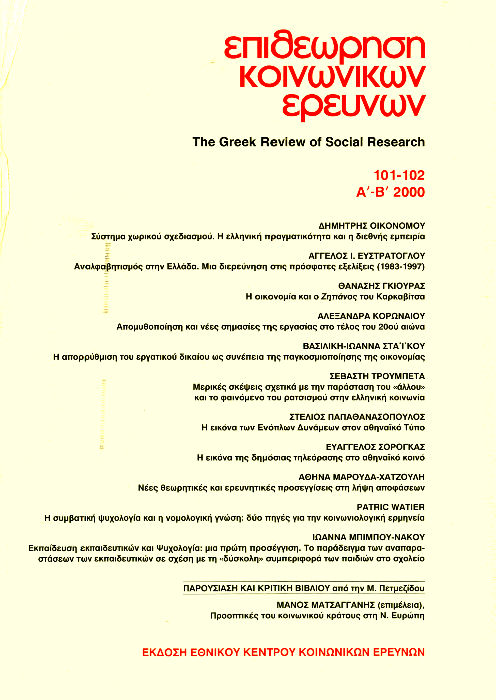Η συμβατική ψυχολογία και η νομολογική γνώση: δύο πηγές για την κοινωνιολογική ερμηνεία
Abstract
Ο συγγραφέας, μελετώντας τα προβλήματα που προκύπτουν στην παραγωγή της κοινωνιολογικής γνώσης από την τομή μεταξύ επιστήμης και κοσμικής γνώσης και εξετάζοντας τις πηγές από τις οποίες αντλεί ο κοινωνιολόγος, επιχειρεί να καταδείξει τη σχέση μεταξύ λογοτεχνικών πηγών και κοινωνιολογικής ερμηνείας. Η κοινωνιολογική ανάλυση μπορεί να ανακαλύψει στα λογοτεχνικά έργα ερευνητικούς προσανατολισμούς που επιτρέπουν στον κοινωνικό επιστήμονα να αποφύγει τις λογοκρισίες ή τις αθεμελίωτες προϋποθέσεις της εργασίας του, οι οποίες εμπλέκονται σε μια επιστημονική ή εμπειριστική παράσταση της επιστημονικής εργασίας. Η παράσταση αυτή είναι εμφανής σήμερα όπου οι κοινωνικές επιστήμες κυριαρχούνται από μια θετικιστική φιλοσοφία.
Article Details
- How to Cite
-
Watier, P. (2000). Η συμβατική ψυχολογία και η νομολογική γνώση: δύο πηγές για την κοινωνιολογική ερμηνεία. The Greek Review of Social Research, 101, 243–264. https://doi.org/10.12681/grsr.1003
- Issue
- 2000: 101-102, Α'-Β'
- Section
- Articles

This work is licensed under a Creative Commons Attribution-NonCommercial 4.0 International License.
Authors who publish with this journal agree to the following terms:
- Authors retain copyright and grant the journal right of first publication with the work simultaneously licensed under a Creative Commons Attribution Non-Commercial License that allows others to share the work with an acknowledgement of the work's authorship and initial publication in this journal.
- Authors are able to enter into separate, additional contractual arrangements for the non-exclusive distribution of the journal's published version of the work (e.g. post it to an institutional repository or publish it in a book), with an acknowledgement of its initial publication in this journal.
- Authors are permitted and encouraged to post their work online (preferably in institutional repositories or on their website) prior to and during the submission process, as it can lead to productive exchanges, as well as earlier and greater citation of published work (See The Effect of Open Access).



